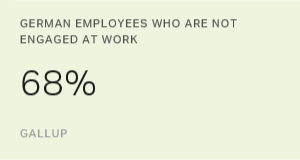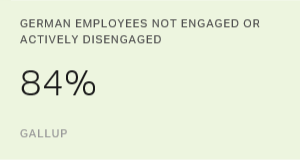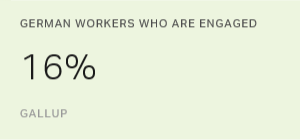Story Highlights
- In Germany, 16% of employees are engaged at work
- Only 22% say performance reviews improved their job performance
- Performance reviews should be frequent, strengths-based and future-oriented
The German economy is remarkably healthy -- but the German workplace is not.
Gallup's latest measure of employee engagement in Germany found that 16% of workers are engaged in, or emotionally and behaviorally connected to, their jobs. The majority are not engaged (68%), which means they aren't putting energy or passion into their work. And 16% are actively disengaged, meaning they are more or less out to do damage to their company.

Conversations between employees and their managers foster employee engagement. A 2015 Gallup study of the German workplace, which included a focus on manager feedback, showed that some managers are making time to have meaningful conversations with employees. Forty-five percent of German workers strongly agree or agree with the statement, "My manager regularly takes time to discuss my performance at work with me," and 42% strongly agree or agree that "My manager regularly takes time to discuss my personal progress at work with me."
Still, when asked whether they have had a conversation about their work performance with their manager within the past six months, only 45% of workers answered yes. Eight in 10 employees who had such conversations were extremely satisfied or satisfied with them, but less than a quarter (22%) strongly agreed that those performance reviews met the actual goal -- to improve their work performance. Employees' positive perceptions of these conversations might come from receiving their managers' attention and feeling recognized.
Helping Employees Improve Performance
The good news is that 60% of those who had a performance review within the past six months strongly disagreed that the conversation felt like an annoying but mandatory exercise for their managers. But just three in 10 employees (31%) strongly agreed that they found the conversation useful and helpful for their personal development.
That's a disturbing result, but it's not the most puzzling outcome the Gallup study found. An overwhelming majority of workers (86%) answered yes when asked whether people in Germany can get ahead by working hard -- except at their company. Only 34% strongly agree or agree that "Employees who perform better grow faster at my organization."
One explanation for this result could be the way in which companies measure employee performance. About four in 10 workers (42%) answered yes when asked if their performance is assessed using measurable performance data, or key performance indicators (KPIs). Among these workers, most (62%) answered yes when asked if their performance is compared with other employees' performance when it is measured using KPIs.
However, 29% of employees also say their performance is compared with that of others, even when it isn't assessed using measurable performance data. This kind of comparison is not objective, transparent or fair. Employees can only improve their performance if their expectations, priorities and responsibilities are clearly defined and objectively measured.
An effective way to support employees in improving their performance is to help them identify their strengths and apply them in their roles. Gallup research shows that building employees' strengths is a far more useful approach to improving performance than trying to improve weaknesses.
When employees know and use their strengths, they are more engaged, perform better and are less likely to leave their company. However, only 17% of German employees agree or strongly agree that they have had a meaningful discussion about their strengths with their manager in the past three months. Helping people become "less bad" doesn't have as profound an effect on performance as helping good workers become great at their jobs.
Conversations Should Be Frequent, Strengths-Based and Future-Oriented
What can managers do to help employees improve their performance? First, conversations between managers and employees about employees' work performance offer a proven way to increase engagement. Among employees who answer yes when asked whether their manager has had a conversation with them about their work performance in the past six months, 31% are engaged -- almost twice the percentage who are engaged among German workers overall (16%). Somewhat surprisingly, the fact that a conversation took place at all has a positive effect on engagement, even if it doesn't help employees improve their performance.
Second, it's important to remember that people want to grow and develop -- but to do this, they need attention and support. Using a static checklist or "interview guide" to review employee behavior doesn't provide employees with the kind of individualized feedback or coaching they need to develop their strengths and improve their performance. Instead, managers need to look at each employee's strengths, performance, needs and potential for development. Managers should talk with them about their work expectations and successes, as well as the barriers that might be keeping them from achieving their full potential. They should focus on employees' strengths and encourage them to apply their strengths in their roles, rather than forcing employees to focus on overcoming their weaknesses.
To make performance feedback as effective as possible, managers need to think more like coaches. For example, take Germany's most successful soccer team, FC Bayern Munich. Their current trainer, Pep Guardiola, doesn't wait for the end of the Bundesliga season to give feedback to his team -- or even until the end of each game.
Managers need to take a similar approach with employees, reviewing their developmental progress regularly and talking with them about their performance throughout the year using multiple feedback sources, such as comments from clients, suppliers or coworkers. When employees improve their performance, they should be recognized and rewarded. This approach moves performance management far beyond a once-a-year or biannual check-the-box exercise.
The primary function of performance reviews is to improve performance. Employee reviews that don't do this are ineffective at best and a waste of time at worst. German managers are too busy for performance reviews that don't do any good, and considering that only 16% of employees are engaged, German companies have no time to lose.
Survey Methods
Results are based on telephone interviews conducted from March 25-April 27 and from Nov. 2-Dec. 4, 2015, with a random sample of 1,429 employed adults. All respondents were living in Germany and selected using random-digit-dial sampling. Interviews are conducted with respondents on landline and cellular phones. Samples are weighted by gender, age, region, profession (job type and role), employment status (full time and part time), and adults in the household. Demographic weighting targets are based on the most recently published data from the German Statistics Office.

